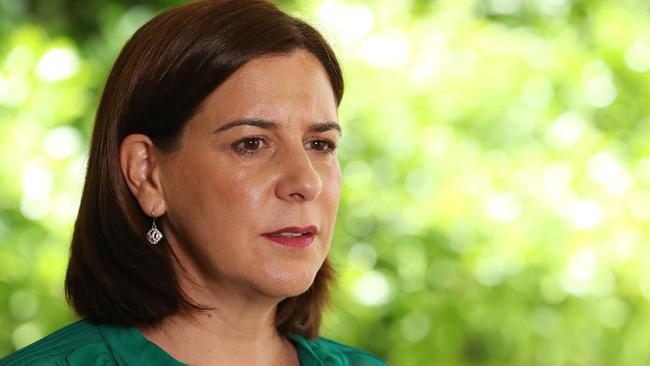Hannah Clarke family murders: Queensland Libs announce new domestic violence election policy
After the murder of Hannah Clarke and her children by her estranged husband, Queensland LNP announces major domestic violence election policy.

Queensland’s Liberal National Party will order an immediate review of the state’s family violence criminal justice system and introduce a new domestic violence offence of coercive control, if it wins the October election.
In a major policy announcement in the wake of the murders of Hannah Clarke and her three children by her estranged husband last week, Opposition leader Deb Frecklington has also promised to introduce a summary domestic violence offence.
The Women’s Legal Service Queensland is calling for a broad review of the criminal justice system and consideration of a separate criminal offence to punish coercive control, a pattern of abusive, intimidatory and controlling behaviour that has been identified as a “red flag” for murder.
The Queensland Police Union have for years advocated for a stand-alone criminal offence of “commit domestic violence,” that would back up the current system of civil-based domestic protection orders.
The LNP has committed to reviewing the entire domestic violence criminal justice legal framework to implement new laws such as coercive control and a specific domestic violence summary offence.
Personal safety devices
The new laws would allow police to issue domestic violence orders on the spot.
The LNP would also increase the maximum penalty for strangulation from seven years’ jail to 14 years’ jail, and would roll out personal safety devices to high-risk people. $2000 grants for emergency accommodation would also be made available.
LNP Leader Ms Frecklington said it was clear the current system was not working and needed an overhaul.
“The Not Now Not Ever report (conducted by Quentin Bryce into domestic violence in QLD) was an important review, but it’s now five years old and we need a fresh set of eyes,” Ms Frecklington said.
“The LNP will commence an immediate review of the entire DV legal framework to implement new laws such as coercive control and a specific domestic violence summary offence.

“The UK led the way with coercive control laws that were implemented after the Not Now Not Ever report was handed down.
“Domestic violence isn’t just physical, it’s emotional and financial control that can have a significant impact as well.
On-the-spot orders
“We also want to empower police to issue on-the-spot domestic violence orders, providing an immediate response to help families while taking pressure off our overburdened courts.
“Tasmania has introduced police-issued domestic violence orders and it’s something we should strongly consider.”
Separate to the LNP’s announcement, Deakin Law School doctoral candidate Paul McGorrery, who is about to publish a book about criminalising coercive control, said the abusive behaviour was not just a red flag for future serious violence, but also harmful in the present moment.
“It can involve the perpetrator putting video cameras at the front of the home, deleting all male contacts from their partner’s phone, stopping their partner from working, so we need an offence that broadly captures it and training for police and prosecutors when to, and when not to, use it,” Mr McGorrery said.
He said criminalising coercive control would not be a panacea for domestic violence, but would play a “small but important role” in a holistic response.
“It demonstrates the state’s denunciation of the behaviour, and legitimises the victims’ perceptions of what they’re going through,” Mr McGorrery said.
“At the moment, coercive control, it’s only (legally wrong) when there’s an intervention order in place and there’s a breach.”
“Criminalising it would give the broader community a language and shared understanding, and hopefully (lead to) a long-term change in behaviour.”
“It would also give police and other in the justice system a tool to intervene earlier. I’ll never say tragic intimate partner homicide could have been prevented, because of the many complex factors (at play), but (criminalising coercive control) has the potential, if police are intervening earlier, to save lives.”
But some advocates are doubtful that adding another domestic violence criminal offence will be effective.
Heather Nancarrow, the CEO of Australia’s National Research Organisation for Women’s Safety warned governments to “proceed very carefully” before making such a law.
“I’m very cautious,” Dr Nancarrow said. “I think it’s a respectful argument we’re having in Australia about this issue, but one of the things I’d say to you, there’s not a lack of criminal law in this area. We have laws on strangulation, stalking and rape. But trying to get another law that’s difficult or impossible to prove, or apply in particular cases.”
“I don’t know if adding another law, on top of the current system, without being able to improve the overall system’s response, is the answer.”








To join the conversation, please log in. Don't have an account? Register
Join the conversation, you are commenting as Logout